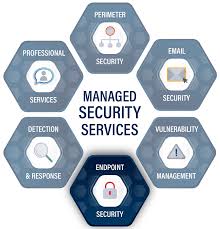Introduction
Managed IT security services are no longer an optional luxury — they’ve become business critical. For U.S. companies facing escalating cyber-threats, compliance demands and limited in-house talent, outsourcing security management is now a strategic priority. In this article, we’ll explore how managed IT security services deliver true value, what to look for in a provider and how outsourcing this function strengthens your enterprise through expert personnel, proven tools and continuous visibility.
What “Managed IT Security Services” Really Mean
At its core, managed IT security services involve partnering with a specialized provider who manages your cybersecurity infrastructure, tools and incident response on a continuous basis. Instead of relying solely on internal staff for firewalls, intrusion detection, endpoint protection, and compliance auditing, you engage a provider that delivers 24/7 monitoring, threat intelligence, consulting and rapid remediation. BlueVoyant+2Optiv+2
This model gives you broad coverage without the burden of hiring, training and retaining large security teams — especially important as the U.S. faces a growing cybersecurity skills shortage. BlueVoyant
Why U.S. Companies Are Switching to Managed IT Security Services
Escalating Threat Landscape: Cyber-attacks are increasing in scale and sophistication. Managed IT security services offer capability beyond what many internal teams can handle. Fortinet+1
Skills Shortage: With millions of unfilled cybersecurity positions globally, outsourcing allows U.S. firms to access expertise they simply can’t assemble in-house. BlueVoyant
Cost Efficiency & Predictable Budgets: Setting up an in-house security operations center (SOC) is expensive. Managed services provide scalable, monthly pricing that shifts security from capex to opex. levelblue.com
Compliance & Risk Reduction: U.S. businesses — especially in regulated industries — must meet standards such as HIPAA, PCI-DSS, GDPR. Managed IT security services help meet these requirements and provide audit-ready reporting. levelblue.com+1
Core Capabilities of Managed IT Security Services
When you engage a service provider for managed IT security services, you should expect:
- 24/7 Security Operations Center (SOC): Continuous monitoring, analysis and response to security events.
- Endpoint Detection & Response (EDR) / Managed Detection & Response (MDR): Real-time threat hunting and remediation across devices.
- Vulnerability & Threat Management: Regular scans, risk ranking and mitigation of exposures. levelblue.com
- Firewall, VPN & Network Security Management: Consistent oversight of network perimeter, remote access and device protection. Fortinet
- Cloud & Hybrid Environment Security: Protection of cloud-based workloads, SaaS applications and hybrid infrastructures. BlueVoyant
- Compliance & Reporting Services: Documentation, policy enforcement and audit support to keep your business aligned.
- Incident Response & Forensics: Rapid action when a breach or security event occurs, minimizing damage and restoring operations.
How to Select the Right Partner for Managed IT Security Services
Selecting a provider for managed IT security services is a strategic decision. U.S. companies should evaluate:
- Expertise & Certifications: Look for teams with CISSP, CISM, GIAC credentials and proven SOC experience. Optiv
- Service Scope & Transparency: Full-service coverage including monitoring, vulnerability management, incident response and consultancy.
- Technology Stack & Integration: Ensure their tools integrate with your environment and support modern platforms such as cloud, endpoints and remote workforce.
- Service Level Agreements (SLAs) & Metrics: Response times, uptimes, reporting dashboards and clear deliverables matter.
- Compliance & Industry Experience: Especially if you operate in healthcare, finance or other regulated sectors.
- Scalability & Flexibility: Ability to scale up services as you grow, adjust for remote work force changes, and align with business priorities.
- Cost & ROI: Understand pricing models, what’s included and the expected return via reduced risk, fewer breaches and improved productivity.
Common Missteps and How Managed IT Security Services Address Them
Underestimating the threat level: Many U.S. companies assume attacks won’t hit them — managed IT support services prove otherwise with real-time detection and proactive hunting.
Overlooking remote & hybrid workforce risks: The shift to remote work expands attack surfaces; providers mitigate this with Zero-Trust access, VPNs and endpoint controls.
Treating security as a checklist rather than a strategy: Partners offering managed IT security services adopt a strategic approach — emphasizing ongoing posture improvement rather than periodic audits only.
Building expensive internal security teams without scale: By contrast, managed services give you access to a broad team of experts and state-of-the-art tools without the full cost.
Lack of incident preparedness: Effective providers include clear incident response plans, to minimize damage and downtime when breaches happen.
Real-World Value: Business Benefits of Managed IT Security Services
- Reduced downtime & business disruption: Continuous monitoring and rapid remediation keep operations running.
- Focused internal IT resources: Internal staff can focus on core business initiatives rather than constant firefighting.
- Lower total cost of ownership (TCO) for cybersecurity: Pay predictable monthly fees instead of high capital investment in a SOC.
- Improved security posture & compliance readiness: Gains in visibility, threat intelligence and audit-readiness.
- Peace of mind for leadership and stakeholders: Knowing the business is defended by experts allows leaders to focus on growth.
Implementation Guide for U.S. Businesses
- Assess your current state: Identify gaps in internal security—tools, talent and processes.
- Define your goals: Compliance, remote work support, cost control or advanced threat detection.
- Shortlist providers: Request detailed service scope, technology stack, SLAs and case studies.
- Plan transition & integration: Onboard the provider, integrate tools, set up dashboards, ensure alignment.
- Monitor & evolve: Regular reviews, threat model updates and adjustments to scaling needs.
FAQs
1. What Are the Top Managed Security Service Providers in the USA?
The leading managed security service providers (MSSPs) in the USA include companies like IBM Security, Accenture, AT&T Cybersecurity, Trustwave, and Secureworks. These providers offer 24/7 network monitoring, threat intelligence, and managed cybersecurity services for both small and large businesses. Choosing a trusted MSSP ensures constant protection against ransomware and data breaches.
2. How Do Managed Cybersecurity Services Protect Businesses?
Managed cybersecurity services protect your business by detecting, preventing, and responding to cyber threats in real time. They include services like endpoint security, firewall management, vulnerability assessment, and cloud protection. By outsourcing to an MSSP, businesses gain expert-level defense without the cost of building an in-house IT security team.
3. What’s the Difference Between MSP and MSSP in Cybersecurity?
An MSP (Managed Service Provider) focuses on general IT services like network setup, system maintenance, and cloud management. An MSSP (Managed Security Service Provider), however, specializes in cybersecurity — offering advanced threat detection, managed firewalls, and compliance management. In short, MSPs keep systems running, while MSSPs keep them secure.
4. Are Managed Security Service Provider Jobs in Demand?
Yes, MSSP cybersecurity jobs are in very high demand in the USA. With the rise in ransomware and phishing attacks, businesses need more cybersecurity analysts, SOC engineers, and threat hunters. According to recent data, cybersecurity job demand is growing at 32% annually, making it one of the fastest-growing tech fields.
5. Why Should a Company Hire a Managed Security Service Provider (MSSP)?
Hiring an MSSP gives your business access to experienced security experts, AI-driven monitoring tools, and 24/7 cyber defense at a lower cost than hiring an internal team. It helps reduce downtime, meet compliance requirements, and enhance your overall cybersecurity
Final Thoughts
In today’s digital environment, choosing the right managed IT security services provider is a strategic decision that can make or break your business’s resilience. U.S. companies that invest in expert, outsourced security gain not only protection, but freedom to innovate, grow and lead with confidence. With the right partner, you’ll convert cybersecurity from a risk into a competitive advantage.






